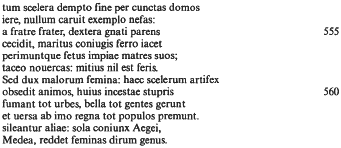Shorter Notes
A tragic fragment in Cicero, Pro Caelio 67?
-
- Published online by Cambridge University Press:
- 11 February 2009, pp. 561-564
-
- Article
- Export citation
Research Article
Three cruces in Juvenal1
-
- Published online by Cambridge University Press:
- 11 February 2009, pp. 252-261
-
- Article
- Export citation
Salpe's ΠAIΓNIA: Athenaeus 322A And Plin. H. N. 28.38
-
- Published online by Cambridge University Press:
- 11 February 2009, pp. 262-268
-
- Article
- Export citation
Shorter Notes
On the interpretation of Cicero, De Republica1
-
- Published online by Cambridge University Press:
- 11 February 2009, pp. 564-568
-
- Article
- Export citation
Research Article
Another chapter in the history of scholia*
-
- Published online by Cambridge University Press:
- 11 February 2009, pp. 269-288
-
- Article
- Export citation
Shorter Notes
Propertius and Livy
-
- Published online by Cambridge University Press:
- 11 February 2009, pp. 568-569
-
- Article
- Export citation
Two notes on Greek dithyrambic poetry1
-
- Published online by Cambridge University Press:
- 11 February 2009, pp. 289-291
-
- Article
- Export citation
A note on Virgil, Aeneid 5.315–19
-
- Published online by Cambridge University Press:
- 11 February 2009, pp. 569-572
-
- Article
- Export citation
Phrynichus fr. 27 K-A: a pun
-
- Published online by Cambridge University Press:
- 11 February 2009, pp. 291-292
-
- Article
- Export citation
Dionysius of Halicarnassus, Antiquitates Romanae 2.30 and Herodotus 1.146*
-
- Published online by Cambridge University Press:
- 11 February 2009, pp. 572-574
-
- Article
- Export citation
The hoopoe's nest: Aristophanes, Birds 265–6
-
- Published online by Cambridge University Press:
- 11 February 2009, pp. 292-294
-
- Article
- Export citation
The date of Claudius' British campaign and the mint of Alexandria
-
- Published online by Cambridge University Press:
- 11 February 2009, pp. 574-577
-
- Article
- Export citation
Is nothing gentler than wild beasts? Seneca, Phaedra 558
-
- Published online by Cambridge University Press:
- 11 February 2009, pp. 577-580
-
- Article
- Export citation
Thucydides 3.12.3
-
- Published online by Cambridge University Press:
- 11 February 2009, pp. 294-297
-
- Article
- Export citation
Thucydides’ Nicias and Homer's Agamemnon
-
- Published online by Cambridge University Press:
- 11 February 2009, pp. 298-303
-
- Article
- Export citation
Dividing the dinner: book divisions in Petronius' Cena Trimalchionis*
-
- Published online by Cambridge University Press:
- 11 February 2009, pp. 580-585
-
- Article
- Export citation
Tacitus, Annals 4.70: an unappreciated pun*
-
- Published online by Cambridge University Press:
- 11 February 2009, pp. 585-587
-
- Article
- Export citation
Nam unguentum dabo: Catullus 13 and Servius’ note on Phaon (Aeneid 3.279)1
-
- Published online by Cambridge University Press:
- 11 February 2009, pp. 303-305
-
- Article
- Export citation
Hebdomades (binae?)1
-
- Published online by Cambridge University Press:
- 11 February 2009, pp. 305-309
-
- Article
- Export citation
More falsa Gelliana
-
- Published online by Cambridge University Press:
- 11 February 2009, pp. 587-589
-
- Article
- Export citation


 . The latter reading was preferred by Bergk, but there seems at first little reason to prefer one order over the other. I shall return to this issue shortly.
. The latter reading was preferred by Bergk, but there seems at first little reason to prefer one order over the other. I shall return to this issue shortly.

